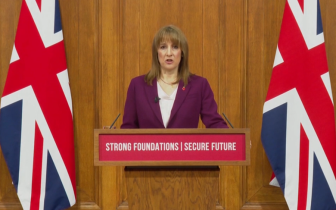
The property industry has responded after chancellor Rachel Reeves appeared to signal possible tax increases in this month’s Budget.
In an early morning speech yesterday, Reeves declined to reaffirm Labour’s manifesto pledge against broad-based tax hikes, citing the challenging state of public finances.
She told reporters: “As chancellor, I have to face the world as it is, not the world that I want it to be. And when challenges come our way, the only question is how to respond to them, not whether to respond, or not.”
The City and the property sector interpreted the speech as an indication that taxes could rise when the Budget is delivered on 26 November.
Industry reaction:
Nathan Emerson, CEO at Propertymark: “With increasing speculation about potential tax rises, it is crucial that careful consideration is given to avoid hampering growth within the housing market, as it is a central engine of the economy.
“It is encouraging to hear the chancellor state that her Autumn Budget is aimed at boosting productivity. Any measures designed to ease the cost of living and positively impact the housing market would be very welcome news for consumers.
“However, with continued uncertainty ahead of the Autumn Budget regarding possible changes to Stamp Duty and National Insurance, both of which could directly affect landlords, these measures will be closely scrutinised. The chancellor must ensure a careful balance is struck to promote future investment and enhance confidence in the sector, especially at a time when governments across the UK are pursuing ambitious housing targets.”
Matthew Thompson, head of sales at Chestertons: “The property market is in dire need of stability. What buyers and sellers really need is consistency rather than short-term headlines. Speculations over the Budget announcements have left very little hope for positive news, however, we would like the Chancellor to consider a potential stamp duty reform or relief, meaningful support for first-time buyers and incentives that encourage downsizers to move. The top end of the property market, which a lot of homes in London fall into, is being held back by high transaction taxes so any further taxation will not help restore confidence amongst buyers or sellers. Lastly, whilst the government has been focused on discouraging buy-to-let investment, we would like to see measures that encourage responsible landlords back into the market to help increase the number of rental properties.”
Nigel Bishop of buying agency Recoco Property Search: “There is little to no hope of the government announcing any positive news this Budget which is already hindering house hunters from making major financial decisions, let alone finalising their search. There’s a certain irony to the current market sentiment as it is a strong buyer’s market but the majority of house hunters simply don’t want to take advantage of this as the economic climate has killed buyer confidence and, with that, the property market. The key to regaining confidence is to minimise stamp duty implications. To get the property market moving again, we would also like the Chancellor to really think about how changes to Inheritance Tax or Capital Gains Tax, for example, could have an incredibly negative long-term impact. To avoid punishing homeowners, we hope for the Budget to include other, more balanced solutions that tackle the UK’s hole in public finances.”
James Nightingall, founder of HomeFinder AI: “We expect the Budget to include tax increases for the UK’s wealthy but want to remind the Chancellor that this move contributed to last year’s exodus of HNWIs and resulted in a loss of investment, talent and business opportunities for the UK. It also didn’t have the positive outcome for the property market that the government had hoped for with many of the investment properties still standing empty as house hunters remain cautious. To drive buyer confidence, we hope for the Budget to include some incentives or initiatives; particularly for first-time buyers who struggle to get on the property ladder or safe up a sufficient deposit.”
Hilesh Chavda, partner at law firm Spencer West LLP: “Rachel Reeves’ speech this morning marks an unusual step, underscoring the challenging position she currently faces. The emphasis on ‘protecting families’ could be more than rhetoric. It may signal significant policy shifts ahead.
“The chancellor could be signalling changes to Capital Gains Tax, property taxation, and even the introduction of a wealth tax or exit tax. If so, this could represent a major recalibration of fiscal priorities for many.”
Keystone Law’s tax consultant solicitor, Michael Fluss: “A proposed mansion tax [whereby the owner of the tax is liable to pay, say, 1% of the amount by which the value of their home exceeds a certain threshold, which, given experience in relation to other taxes could be expected to be lowered in the future and, in any event, may not be index linked] could well be the first national non-business tax levied on individuals not linked to the payment or receipt of value. It would be highly punitive and would result in hundreds of thousands of homeowners [and maybe more in time] becoming, in effect, tenants of the state.
“Further, appeals against high valuations of homes by HMRC could be a two-edged sword if any mansion tax is accompanied by a capital gains tax charge on the sales of main residence homes on the amount by which the sale price exceeds that threshold [up to the amount of the gain]. Distortions in the residential property market as the interests of sellers and purchasers become diametrically opposed as never before can be expected. A cynic might question whether HMRC might accept the mansion tax being discharged by a payment in kind in the form, say, of superfluous bricks or roof tiles, but then it really would be a gutter tax.”
Read the orginal article: https://propertyindustryeye.com/property-industry-responds-to-rachel-reeves-speech-on-upcoming-budget/?utm_source=rss&utm_medium=rss&utm_campaign=property-industry-responds-to-rachel-reeves-speech-on-upcoming-budget


